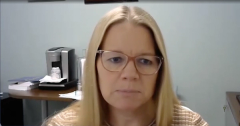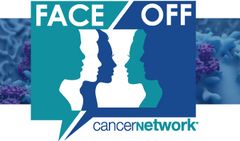
Phase 3 ASCEMBL Study Demonstrates Superiority of Asciminib in CML-CP
Talha Badar, MBBS, MD, discussed the results of the phase 3 ASCEMBL trial, demonstrating the superiority of asciminib versus bosutinib in patients with chronic myeloid leukemia in chronic phase.
Episodes in this series

As part of CancerNetwork’s Face-Off video series, Talha Badar, MBBS, MD, assistant professor of oncology, Mayo Clinic, discussed results from the phase 3 ASCEMBL study (NCT03106779) of asciminib (Scemblix) versus bosutinib (Bosulif) in patients with chronic myeloid leukemia in chronic phase (CML-CP) after ≥2 prior tyrosine kinase inhibitors (TKIs).
Badar: So basically, the phase 3 ASCEMBL trial was done to evaluate the efficacy of asciminib, which is a novel CML therapy, which is different from conventional tyrosine kinase inhibitors. It's an stamp inhibitor, and it is used to have less side effects compared to conventional TKI-based therapy. So, it was compared to second generation TKI, which is bosutinib. And the primary end point of the study is the proportion of patients achieving measurable remission at 6 weeks of therapy.
So [in] that phase 3 randomized study, patients were included with 2 or more prior lines of TKI therapy, [had] CML in chronic phase. The study met the primary end point of achieving major measurable remission better than bosutinib. And that led to approval of asciminib In patients with more 2 or more prior lines of TKI or patients with D315I mutation in which most of the TKIs are resistant, apart from ponatinib [Iclusig].
So the ASCEMBL study which we discussed in our CancerNetwork Face-Off [program] was a dynamics of response and response factors in patients with CML with 2 or more prior lines of therapy. It's an exploratory analysis.
There is a concern that asciminib works differently, the duration response achieved with this therapy may not be sustained for long period of time. So basically, in this analysis, they tried to see how the patient responded at different intervals from 6 weeks to 24 weeks, and to 96 week, which is 2 years.
So there is some positive finding, which suggests the superiority of asciminib achieving long-term measure marker response in these patients. The patient will further divide into 2 cohorts in this study, patients who had a B-cell of more than 10% at the start of the study versus patients who have B-cell able transcript, less than 10% on Tasha scale at the start of study, and the response was evaluated at 24-weeks and 96-week intervals.
So patients who had more than 10% fusion transcript, around 23% of patients achieved dsustain MMR at the 2-year interval. The patients who were the less than 10% fusion transcript by IS had a better response intuitively, and 60% of those patients maintained MMR.
The other aspect of the treatment and treatment paradigm evaluated in this study was to see, was there any impact of prior TKI use in terms of patients getting asciminib and bosutinib. So the best outcome in patients who had a first-generation TKI like imatinib [Gleevec], and had a best outcome with asciminib, with the major marker response around 55.6%, compared to bosutinib, only 14.3%. And the less favorable but still better than bosutinib was a group of patient who had a prior pacritinib [Vonjo] in which 20% of patient had maintained MMR at 2 years mark, compared to 11% in patients who got bosutinib.
And the therapy was well tolerated. The usual side effects we see in this trial in the bosutinib group more patient had a GI intolerance. As we know before in SML-POM there wasn't much GI side effects apart from times myelosuppression, some cytopenia, neutropenia, that could be comparable to the bosutinib arm.
So in conclusion, I would say that the responses achieved with asciminib in patients who have CML with prior 2 or more lines of therapy were far better than bosutinib. And the responses were maintained at the t2-year mark. Responses were better in patients who had a B-cell within 10% at the time of the study compared to those who have B-cell more than 10%. So it maintains the superiority over bosutinib in the phase 3 study.
Transcription edited for clarity.
Newsletter
Stay up to date on recent advances in the multidisciplinary approach to cancer.






































